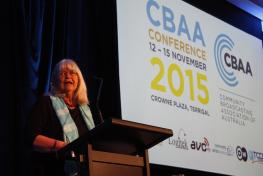
#CBAAconf: Wendy Bacon congratulates community media on being the most democratic media in Australia
There wasn't any doubt that the gathering of community broadcasters in Terrigal this weekend warmly welcomed Keynote Speaker Wendy Bacon, and it seems that the fascination was mutual.
Opening her Keynote Address, she pondered whether there could be any singular gathering that would represent such a diverse group of people.
This diversity, Bacon said, is "so valuable in a country like ours, which doesn't have a democratic media". In fact, that "community radio is the most democratic thing in Australian media".
Bacon touched on her own experiences of community radio, and it was nteresting to see that much of her work had community radio woven in somewhere along the way. She gave props to people and shows around the sector, including a shout out to favourite shows (Backchat on FBi Radio) and thanks to people like Tiga Bayles for a great contribution to the development of Indigenous media in Australia. She also referenced the start of Liverpool community station 2GLF in the same building as the women's health services she was working on in the 1970s.
At the core of Wendy's address was the principle that all communities need a voice. That those communities need to be able to speak for the themselves, and that community radio is about this empowerment and contrasts threats to the core ideas of community being threated by private development interest.
In speaking about technology, Wendy shared that "technological changes are not more important than the core ideas and content of community radio", but also stressed that it is critical that community media "keep up" and embrace new technologies or risk becoming isolated from their communities.
Bacon spoke of the importance of community media in sharing "secret stories". She spoke of her days as Editor of the University of New South Wales' student paper and the incidents during what she called a "repressive period of media" that were not given coverage. In the context of contemporary issues including climate change, urban renewal and gender, Bacon said finding and sharing these stories today is no less important.
One of community radio's greatest strengths, she said, is its capacity to give people a space to speak, and the time to be heard. Reflecting on her own experiences speaking on Eastside Radio in Sydney, Bacon said that "on many local struggles, a freer voice is what I'd like to hear more of".
This kind of "citizen storytelling" can help give a voice to stories and people not heard elsewhere. On the issue of domestic and family violence, Bacon focused on the hyper local and how community media can seek to report stories, urging stations to be the voice of their local community organisations. Bacon, an academic herself, also suggested that educational institutions may be able assist the sector in synthesising an accurate, complex picture of where those hidden stories are the black holes in the wider media landscape.
Concluding, Bacon encouraged the gathering of community broadcasters to continue in its original tradition of being an expression of community need and of those parts of the community that are marginalised. To close, she gave her congratulations to the sector on its important work as Australia's most democratic media.
A recording of Wendy's full address is available to stream below:
About Wendy Bacon
Wendy Bacon was part of the women's liberation, green bans and alternative journalism movements in the early 1970s.
In 1975, she was working at the recently opened Liverpool Women's Health Centre. In the late 1970s, she was part of the Women Behind Bars movement and produced a study of women homicide offenders for the Feminist Legal Action Group. In the 1980s, she worked for Channel Nine, Fairfax media and SBS. She is an award-winning journalist who became the Professor of Journalism at UTS where she taught investigative journalism for twenty years. Through her role at UTS, she was involved for many years with 2SER. She is currently a contributing editor to the online progressive publication New Matilda and produces her own blog wendybacon.com. She is an 'activist journalist' who is involved in urban environmental issues and the campaign to restore feminist women's refuges in NSW.
Facebook comments